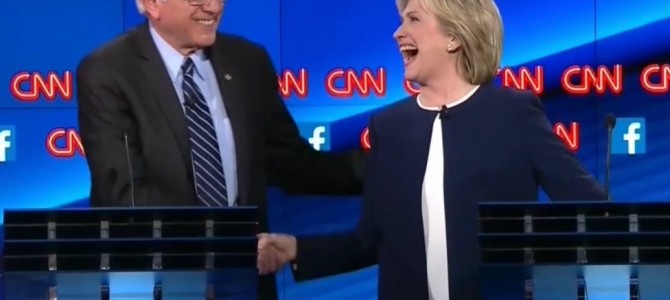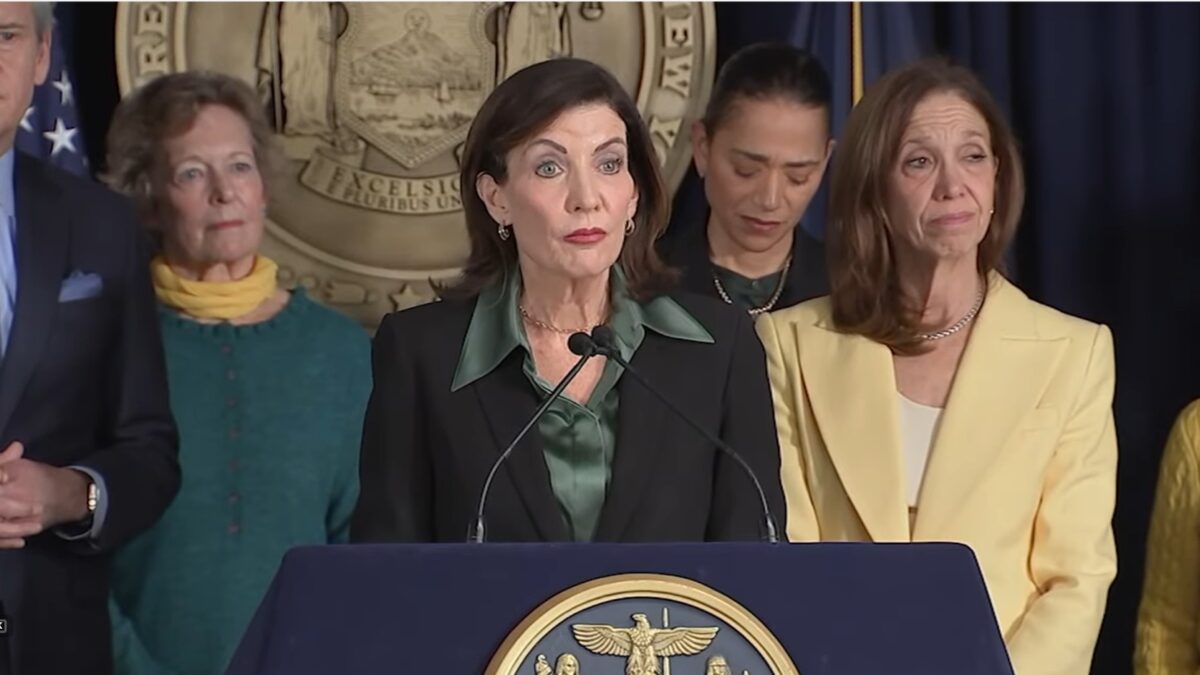
The Left loves to ridicule Republicans for standing on the “wrong side of history.” And let’s concede, for this piece at least, that conservatives hold hopelessly archaic views on social and cultural issues. But what if there were a party whose economic case rested on undermining the most successful, poverty-reducing, prosperity-creating idea ever known to mankind? What would history say about that?
No one seems too troubled that Democrats ratchet up the collectivist rhetoric every election. We mock conservatives for red-baiting and throwing around the word “socialism.” And let’s face it, the term is overused and misunderstood. But as we saw in the Las Vegas the other night, the Democratic Party is not a party of Great Society liberals anymore. We’re not talking about lifting the marginal tax rates a few points, at least not rhetorically. Bernie Sanders isn’t only pulling a quarter of Democrats to his cause, he’s pacing the field ideologically.
In a New York Times piece this April describing Hillary’s alleged progressive epiphany, we learned that the Democratic Party front-runner believes a sound economy requires the “toppling” of the wealthy. Where taxes were once conceived to fund safety nets, police, education, communal improvements through infrastructure, and the nation’s defense, nowadays Democrats talk about taxation as if it were a tool to take from the undeserving—whose ill-gotten gains are built on a foundation of skulls from the victims of a “rigged” system—and give to companies, people, and programs to create societal equality, justice, and harmony.
Has history ever proven that this works?
Theory Versus Practice
In practice, of course, there’s not any difference between a Democratic Socialist and a Progressive Democrat — Hillary’s preferred designation these days — other than, perhaps, the speed at which one wants to work. (Ask her to explain the difference.) Sanders likes to stress the distinction between a Democratic Socialist and your commonplace authoritarian. But state coercion against individuals, even with the blessing of a majority, is still state coercion. Controlling the means of production, even if you attempt to achieve your goal with a combination of punitive taxation, fees, regulatory schemes, cronyism, and executive action, is still controlling the means of production. Sooner or later one kind of authoritarianism leads to another.
I’m not arguing that we’re there yet. We’re certainly not. But I’m asking: where does the Democratic Party end up on this ideological trajectory? At some point people are going to expect your policies to match your rhetoric.
YouGov recently found that while only 52 percent of Americans have a favorable view of capitalism, 26 percent have a favorable view of socialism. Among Millennials, 36 percent have a positive view of socialism. Democrats were just as likely to have a favorable view of capitalism (43 percent) as they do of socialism. Will these people find socialism as positive in practice as they do in theory?
Just because Uber exists or kids own iPhones does not mean they will reject collectivism — a theory that’s popular among conservatives. Young voters haven’t seen it. Nor do they understand the incredible success economic freedom has had in alleviating real poverty.
Recently,  the World Bank projected that world poverty would fall to a record low of 9.6 percent in 2015. The principal reason for the expected decline is the spread of economic freedom. As The Economist reported recently, between 1990 and 2010, the number of destitute fell from 43 percent to 21 percent. This is a reduction of almost one billion people. China’s capitalistic reforms have allowed around 680 million people to escape poverty from the 1981-2010. The extreme poverty rate in China was 84 percent in 1980, and now it’s 10 percent. This expansion of prosperity happens in places that feature an array of races, ethnicities, religions, resources, and climates. What they share is more economic freedom.
the World Bank projected that world poverty would fall to a record low of 9.6 percent in 2015. The principal reason for the expected decline is the spread of economic freedom. As The Economist reported recently, between 1990 and 2010, the number of destitute fell from 43 percent to 21 percent. This is a reduction of almost one billion people. China’s capitalistic reforms have allowed around 680 million people to escape poverty from the 1981-2010. The extreme poverty rate in China was 84 percent in 1980, and now it’s 10 percent. This expansion of prosperity happens in places that feature an array of races, ethnicities, religions, resources, and climates. What they share is more economic freedom.
Debunking the Zero-Sum Myth
But Democrats have been successful in perpetuating the zero-sum myth as the basis for most debate. When capitalism fails — because of criminality, abuse, or even because it must (such as creative destruction) — there is an indictment of the entire of system. Then liberals tell us this ‘failure’ necessitates less freedom or perhaps some anti-market reconfiguration (green economy and so on) of the real thing.
Liberals like to claim that if a person supports any government program it means that person enjoys the benefits of socialism. You’re a fan of Social Security? You love socialism! You like public education? Yep, you guessed it. You’re a fan of alternative energy — or whatever euphemism we’re using now for state-subsidized energy schemes — you need socialism to get it done. But of course, all of that is propped up by a productive markets. If you’re a fan of the subsidized electric car, thank the capitalist for allowing you to be a hobbyist.
Now, Donald Trump might be a clown, but his brand of showman populism doesn’t rest on any coherent ideology. Certainly in most ways it doesn’t represent the party. Bernie Sanders, though, who in a smaller field of Democrats can claim to be far more successful in his party, brings with him an ideology that has a long track record. Yet, what major player on the Left has voiced concern that an extremist is running strongly in a dominant American political party — or, for that matter, that most Democrats are starting to sound just like him?









